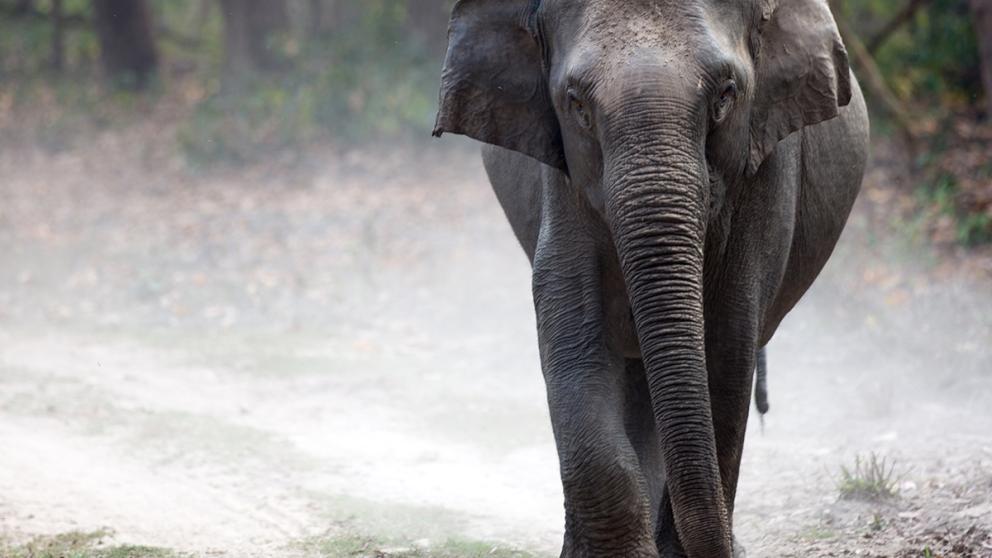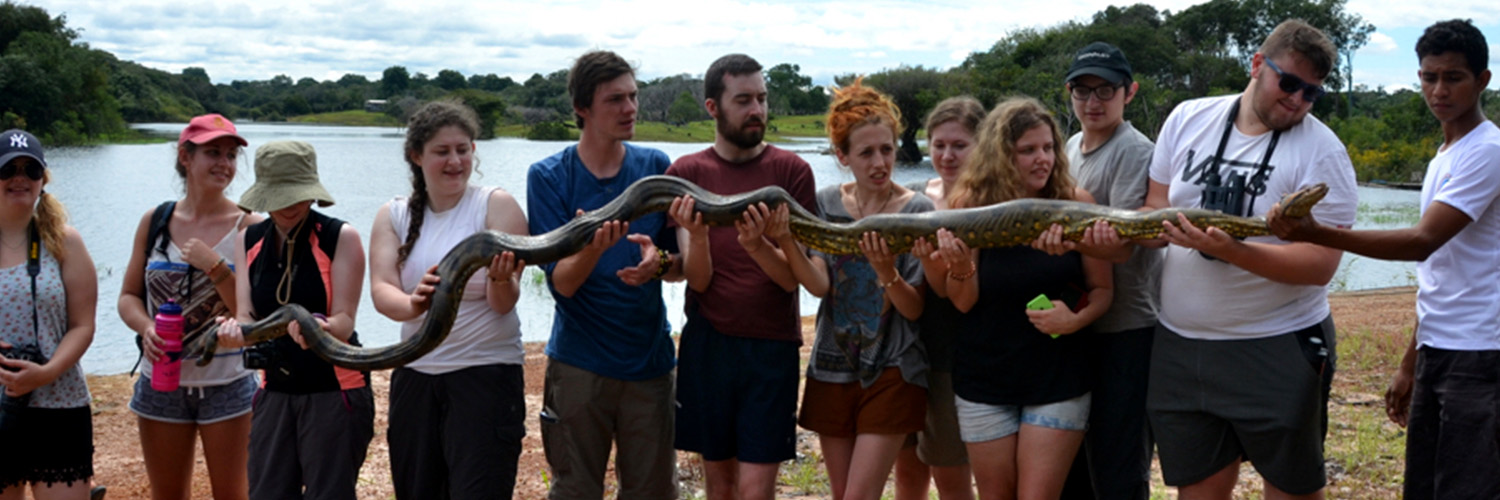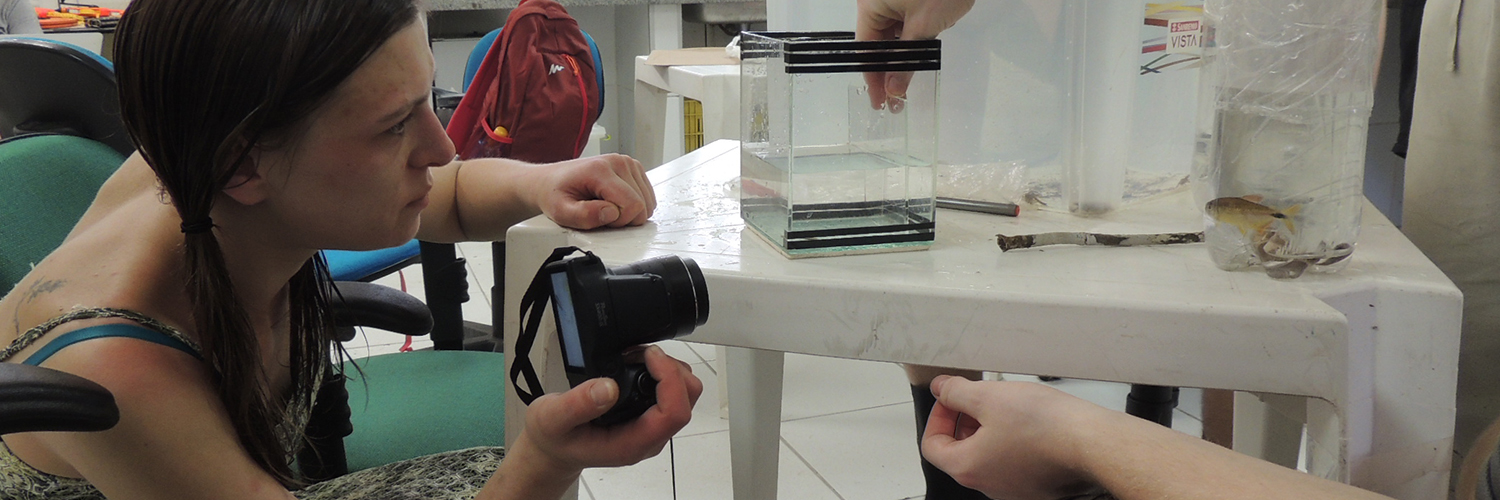
Wildlife Conservation
Full-time
Part-time
With placement
Three year
Six year
Four year
September 2026
In a nutshell
Precious wildlife habitats and biodiversity are in danger. Be part of the solution and study the ecology and behaviour of animals in the wild with our BSc (Hons) Wildlife Conservation degree.
We focus your learning on core conservation issues, the physical environment and landscape. You will experience hands-on learning in our advanced Bodmer laboratories and develop transferable skills interpreting biological field data. As your studies progress, you will gain theoretical and practical understanding of wildlife, wildlife ecology and environmental problems that threaten species.
Through our close industry connections, and our use of immersive field trips, we will help you bring textbook theory to real-world practice as you experience UK and international field trips to zoos, animal parks and wetlands. The course is accredited by the Royal Society of Biology.
Salford ranks 8th on People & Planet's University League
People & Planet is the largest student network in the UK campaigning for social and environmental justice. They envision a future in which spiralling inequality, instability, climate crisis and resource depletion are reversed, and a world in which the balance of power in society has fundamentally shifted to an equal world that benefits all of us. University of Salford scored 71.0% and ranked 8th in the University League, with our highest scores in Managing Carbon, Staff and Student Engagement and Education for Sustainable Development.
This programme includes an optional placement year approved by an academic placement coordinator, which offers you the chance to put your studies to use in a real working environment.
Start your study journey
Register for our next Open Day to learn more about studying wildlife conservation, explore our facilities and meet the course team
You will:
- Gain a broad understanding of wildlife, wildlife ecology and environmental problems
- Acquire the practical skills used in wildlife conservation and zoos
- Experience a variety of field trips and residentials, both in the UK and overseas
options available
students accepted
Course accreditations

This is for you if...
You want real-world experience through field trip and placement opportunities (including international)
You are passionate about wildlife and want to learn about vital conservation work
You enjoy working outdoors in all weathers, as well as collecting and analysing data
All about the course
Course delivery
There has never been a more urgent time to reduce the loss of biodiversity and protect endangered wildlife. We have shaped our BSc Wildlife Conservation course to provide you with a solid understanding of wildlife, biodiversity and conservation issues, and the skills to monitor environmental change and lead habitat conservation and restoration.
Through three years of study - or four, if you choose to include an industry placement, you will advance your wildlife conservation knowledge and skills through a variety of specialist modules including behavioural ecology, conservation biology, practical ecology and conservation, and monitoring environmental change. In your final year you will also complete a research project based on a subject topic of your choice.
Learn more about the modules you will study in the section below.
Learning experience
We put fieldwork at the heart of your learning experience. You'll have plenty of opportunities to get involved in UK-based residential courses going to places such as Blencathra in Cumbria and the Isle of Cumbrae in Scotland. You will also have the chance to take specialist modules, where you will travel to tropical locations for fieldwork. In recent years students have been to locations such as Gambia and Brazil.
Small group, research-led teaching is another key course benefit. During your studies you will spend time in our advanced Bodmer laboratories, and you might also have opportunities to engage with live research projects.
Industry placement
On this course, you will have the option to take an industry placement year between years two and three. Although you will be responsible for securing your placement, our tutors will support you in finding a role, and monitor your progress throughout.
Industry placements are an excellent way to enhance your CV, gain hands-on work experience and build industry connections. We often find that placement students achieve higher final year grades.
Previous wildlife students have completed work placements both in the UK and overseas in South Africa, Madagascar, Spain, Greece and the USA, working with a wide range of animals from donkeys and wolves to seals and turtles.
Introduction to Zoo Biology
This module provides an integrative approach to understand basic concepts of zoo biology. It is largely lecture-based, and also includes day trips to local zoos.
Biodiversity
Life arose on Earth at least 3.5 billion years ago. Today, Earth hosts an extraordinary diversity of organisms, with recent study estimating that there are between 2 and 20 million eukaryote species alive today (the vast majority of which have still not been identified and described by scientists). However, this is a small fraction of all the species that have ever lived, >99.9% of which are extinct. This module will give you an overview of this remarkable biodiversity, focusing on the major groups, their characteristics, their diversity, and their evolutionary relationships.
Global Distribution of Wildlife
This module will give an overview of the world’s major biomes and, using case studies from around the globe, will explore the principal factors that drive the distribution of species and communities and the way wildlife adapts to these factors. Moreover, the module will provide you with a sound understanding of how the application of biogeographic principles can aid conservation planning.
Field Biology
This module will introduce students to field techniques required for ecological surveys of land and aquatic habitats. Learning will be delivered by lectures, non-residential fieldwork, computer and practical classes. The module will develop students to identification and taxonomy skills, and introduce GIS and its uses within fieldwork.
Genes to Ecosystems
In the first trimester, this module provides a systems-led approach to understand basic concepts of genetics. In the second trimester, this approach is extended to understand basic concepts of ecosystems.
Study Skills
In this module you will learn by observation, investigation, comparison and engagement and will develop practical learning and presentation methods which can be applied generically during year one and beyond. You will also gain an appreciation of Personal Development Planning and effective data handling, calculation and numerical skills.
Conservation Biology
This module will introduce you to the modern concepts of conservation biology at the level of species and populations, the existing tensions between theory and practice in species conservation planning, and an overview of the interdisciplinary toolbox used by conservation biologists (for example IT packages and DNA fingerprints). You will also be given the chance to design an appropriate conservation programme for a species or population, including the projection of future survival under varying scenarios.
Wildlife Behavioural Ecology
This module focuses on the principles of wildlife ecology and animal behaviour with particular reference to mammal and bird species. It also introduces scientific methods in the study of ecology and behaviour.
Monitoring Environmental Change
This module provides a research led introduction to some of the techniques used to assess and evaluate the changing and challenging conditions our planet is experiencing. Through a suite of integrated lectures, fieldwork, laboratory and IT sessions you will experience the approaches and strategies used to monitor human impacts on the environment in abiotic (non-living e.g., soils and sediments) and biotic (living) contexts and the use of Geographical Information Systems (GIS) to integrate patterns and processes in environmental data. The module is assessed through the practical application of such techniques working on regional examples with local conservation bodies.
Ecology in Action
You will study the fundamental principles of population and community ecology, including the impact that factors such as competition, predation and parasitism may have on population size and community structure. This module also has a residential field course where students put theory into practice and conduct their own ecological studies.
Research Skills
The aim of this module is to show you how to learn by observation, investigation, comparison and engagement and to develop your practical learning and presentation methods which can be applied generically during the rest of the course and beyond.
Choose one option from the following:
Ocean Challenges
In this module you will learn about the challenges faced by the marine ecosystems and marine organisms. The module provides you with the opportunity to engage in actual data collection and data analysis during a residential course (compulsory to the module). You will also look at contemporary environmental issues in marine biology. The module encourages you to adopt an investigative approach to ecological studies.
Primate Behaviour and Conservation
This module aims to provide you with knowledge of the structure and evolution of primate societies. You will look at the Primate Order, its distribution and the conservation priorities for primate species. You will gain an understanding of the ecological and demographic processes that underlie different types of social systems and an insight into the way in which evolutionary ecological, genetic and physiological analyses can facilitate this understanding.
University Wide Language Programme
This module provides the opportunity to learn or develop a language with the University-wide language programme.
Environmental Geographical Information Systems
This module is to develop your geographical information systems (GIS) knowledge and ability to use the ArcGIS software and understand the factors controlling the design and implementation of GIS solutions to map, monitor and model terrestrial environments. You will learn the theory behind GIS as well as how GIS can be applied to Wildlife Conservation. You will gain hands on experience of using GIS on a species of your choice and determine how GIS can inform conservation decision making.
Practical Ecology and Conservation
This module aims to equip you with the basic knowledge and skills needed for ecological consultancy. It is designed to promote employability and apply academic qualifications to a growing sector that seeks to provide expertise on ecological and environmental issues to industry, governmental agencies and other organisations. You will be given an overview of consultancy and the ecology of survey methods used for protected species and habitats. The main assessment will involve you proposing surveys for a client wanting to build on a specified site, in addition to carrying out surveys in practical sessions.
Final Year Project and Professional Skills
This dissertation module allows you to develop independent research skills, including both data collection/generation (for example, via lab-based research or fieldwork) and analysis, while conducting research on a topic in an area relevant to your programme of study. You will also develop your professional skills, with a focus on employability.
Choose two options from the following:
Animal Cognition and Social Complexity (Wildlife)
The aim of this module is to develop an understanding of the cognitive abilities and limitations of nonhuman animals, with a particular focus on nonhuman primates. The course also develops your understanding of the cognitive challenges associated with living in complex social groups.
Mitigating Climate Change
In today’s current climate, it is important to understand the underlying scientific principles of how the changing climate has an effect on the natural world, urban environments and society. This module will give you this knowledge, and the confidence to analyse the implications of change on biodiversity, ecosystems and society, whilst identifying the adaptations and mitigation options that are available. You will also learn how to explore the viability of these options and gain the skills to effectively communicate your ideas in formal and informal settings (ranging from social media, through to intellectual debates).
Tropical Ecology and Conservation
This module is based round a 2-week field trip to a tropical biology field station. Students will learn concepts in, and approaches to, tropical ecology and conservation and biodiversity in tropical ecosystems. The module involves an independent research project in the field that will be written up as a scientific report.
Bird Biology and Conservation
In this module, you will gain a critical understanding of avian diversity, form, function and behaviour. You will carry out an investigation into avian ecology and adaptation, collect behavioural data from wild birds and analyse acoustic data using specialist software. You will also learn about the ecological importance of birds and develop an awareness of bird conservation.
University Wide Language Programme
This module provides the opportunity to learn or develop a language with the University-wide language programme.
We take a flexible approach to our course delivery that promotes diversity and inclusivity and provides a blended learning experience, which will vary to meet specific programme requirements. This learning time includes formal lectures and interactive activities such as seminars, tutorials, practical sessions, laboratory and studio learning. Smaller classes may be used to support collaborative activities such as project and group work and presentations. A range of different assessments and feedback is offered to meet the needs of both our diverse student body and specific subject needs.
Our undergraduate courses are normally made up of 20 credit modules which are equal to 200 hours of learning time. A three-year degree qualification typically comprises a total of 360 credits (120 credits per year).
Please note that exact modules and content offered may vary in order to keep content current and, for courses that offer optional modules, may depend on the number of students selecting particular options. When accepting your offer of a place to study on a programme with optional modules, you should be aware that optional modules may not all run each year. Your tutor will be able to advise you as to the available options on or before the start of the programme. Whilst the University tries to ensure that you can undertake your preferred options, it cannot guarantee this.
Frequently asked questions
What is wildlife conservation?
Wildlife conservation is the preservation and protection of animals, plants, and their habitats. By conserving wildlife, we're ensuring that future generations can enjoy our natural world and the incredible species that live within it.
What are the goals of wildlife conservation?
Wildlife conservation is mainly focused on one thing: protecting precious ecosystems that are threatened. On our wildlife conservation programme, you will study the ecology and behaviour of animals in the wild and gain the skills to monitor environmental change and lead habitat conservation and restoration.
What are the best ways of conserving wildlife?
Conservation can take many forms including, but not limited to, habitat conservation, sustainable land-use practices, research and monitoring, and public education and awareness. On our wildlife conservation programme, you will study various conservation practices and even put your knowledge and skills to practical use on field trips.
What job can I get with a Wildlife Conservation degree?
Some of the roles our students go into after graduation include:
- Ecologist
- Ecological Consultant
- Wildlife Rehabilitation
- Zoo Keeper
- Zoo Education Officer
- Media Industries (e.g. BBC Natural History Unit)
- Teacher
School of Science, Engineering and Environment
Rising to the challenge of a changing world, our degree courses are designed to shape the next generation of urbanists, scientists, engineers, consultants and leaders.
Driven by industry, and delivered by supportive programme teams, you can develop the knowledge and skills to become unstoppable in your career.
facilities
As a wildlife conservation student, you will be based in our advanced, integrated teaching laboratory known as the Bodmer Lab. This specialist, purpose built facility ensures that you benefit from the latest technologies to keep teaching and learning apace with cutting-edge innovation and discovery.
Industry collaboration and research
When you start this degree with Salford, you are also joining a community making a difference in industry, our local region and in our wider society.
Many of our academics and technicians who support your course also deliver collaborative, interdisciplinary, high-impact work in a range of bioscience issues and challenges.
Discover how you are part of something bigger.
What about after uni?
Employment
The course is designed to help you to develop a range of personal and professional skills which will make you highly-employable. These include building specialised wildlife conservation knowledge as well as report writing, data interpretation, and team work and project management skills.
With the global push to do less harm and alleviate the impact of climate change on wildlife populations across the planet, both public and private sectors are opening up roles for wildlife graduates to apply knowledge and skills that can make a difference for our world.
There are many opportunities to gain employment in non-governmental organisations (NGOs), the voluntary sector and government conservation organisations operating at local, national and international levels. Opportunities exist to work as ecologists and environmental consultants, and in environmental education and captive animal environments. Previous students have gained employment in wildlife rescue centres, country parks, animal sanctuaries, zoos, and environmental and ecological consultancies.
How graduate Cris secured a role with the Lancashire Wildlife Trust
Further study
You might find you want to learn more about biosciences. Building on our scientific expertise, we offer a range of postgraduate courses that can take your interests and career opportunities further. Salford graduates and alumni also receive a generous fees discount.
- Biomedical Science (MSc)
- Biotechnology (MSc)
- Drug Design and Discovery (MSc)
- Wildlife Conservation (MSc)
Wildlife Conservation graduates can also choose to follow a research programme with our Biomedical Research Centre or our Ecosystems and Environment Research Centre to further their knowledge in topics such as microbiology, parasitology and conservation. Some of our graduates have completed PhD research studying orangutans in Borneo, large animals in Tanzania.
Learn more about postgraduate research opportunities available through our Doctoral School.
WHAT YOU NEED TO KNOW
Applicant profile
You will have a genuine broad interest in wildlife and conservation, enjoy working outdoors in all weathers, as well as collecting and analysing data. We expect you to be interested in biology, geography and the environment.
We also welcome applications from mature students who may not have academic qualifications in relevant subjects, but have experience in zoos or conservation organisations.
English language requirements
If you are an international student and not from a majority English speaking country, you will need an IELTS score of 6.0 with no element below 5.5. We also accept a range of other English language qualifications.
If you do not have the English language requirements, you could take the Pre-Sessional English course, or the International Foundation Year to gain entry onto this degree.
Course accreditation
This course is accredited by the Royal Society of Biology, which means that it meets their requirements for receiving up-to-date knowledge in the right learning, support and teaching environment. Studying an accredited course is one way of showing employers you have the knowledge and skills that they are looking for in graduates and has the potential benefits of greater employability prospects and enhanced competitiveness in a crowded global jobs market.
UCAS tariff points
104 - 112 UCAS points.
A level
104 - 112 UCAS points. Two full A-levels required as a minimum. All subjects accepted.
BTEC Level 3 National Extended Diploma
DMM.
T Level
Overall M in the following T Level subjects: Science Animal Science Must have passed all components.
Scottish Highers
104-112 UCAS points from two Scottish Higher Levels required.
Irish Leaving Certificate
104-112 UCAS points from two Higher Levels required.
International Baccalaureate
30 points overall. Must have passed the full International Baccalaureate to be considered.
Access to HE
104-112 UCAS points from a QAA Approved Level 3 Access to HE Diploma.
GCSE
In addition to Level 3 requirements, you must have evidence of Level 2 GCSE English and Maths at Grade C/4 or above.
International Students
We accept qualifications from all around the world. Find your country to see a full list of entry requirements. If you do not meet the entry requirements, you could take the International Foundation Year to gain entry onto this degree.
Salford Alternative Entry Scheme (SAES)
We welcome applications from students who may not meet the stated entry criteria but who can demonstrate their ability to pursue the course successfully. Once we have received your application we will assess it and recommend it for SAES if you are an eligible candidate.
There are two different routes through the Salford Alternative Entry Scheme and applicants will be directed to the one appropriate for their course. Assessment will either be through a review of prior learning or through a formal test.
How much?
| Type of study | Year | Fees |
|---|---|---|
| Full-time home | 2026/27 | £9,790 per year |
| Full-time international | 2026/27 | £18,120 per year |
| Part-time | 2026/27 | Part-time fees are calculated on a pro rata basis |
Tuition fees will increase in the second and each subsequent year of your course by the rate of inflation, subject to the maximum fee limits set out by the UK Government.
Additional costs
All national field trips are funded by the University, but you may need to consider additional costs such as food during day trips and spending money.
For the international field trip to the tropics (as part of the optional module Tropical Ecology and Conservation) you will also be subsidised by the University, but a major contribution to flights and in-country costs will apply. You will be made aware of these costs before selecting the module.
You should also consider further costs, which may include books, stationery, printing, binding and general subsistence on trips and visits.
Scholarships for international students
If you are a high-achieving international student, you may be eligible for one of our scholarships. Explore our international scholarships.
All set? Let's apply!
Enrolment dates
Student information
Terms and conditionsUCAS information
Course ID C180
Institution S03



